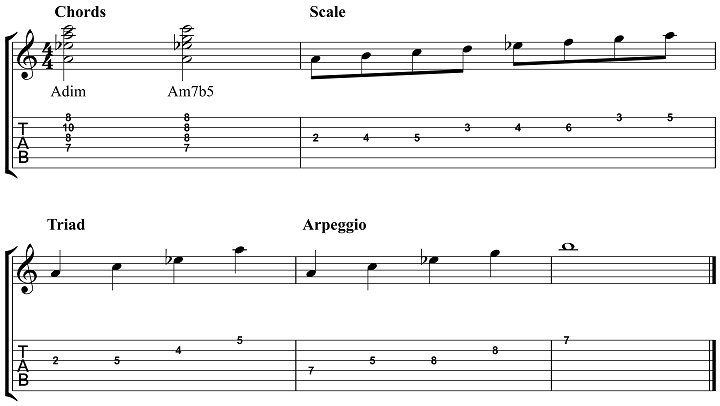The Locrian #2 Mode
In this series of articles we will be taking a look at the different sounds that you can build from any mode in the Melodic Minor scale, in particular the chords, scale, triad and arpeggio that go with each mode in the Melodic Minor scale system.
In today’s lesson, let’s take a look at the chords, scale, triad and arpeggio that are built from the 6th mode of Melodic Minor, the Locrian #2 Mode.
Besides learning a fingering or two for this important scale, it is good to know the other melodic and harmonic devices that are built from the Locrian #2 Mode so that you can apply these to your practice routine, as well as build your theory chops so that you recognize when to use the Locrian #2 Mode in your soloing and song writing.
Here is a quick look at each device from the Locrian #2 Mode, with further details provided below to read further.

Locrian #2 Triad and Chords
To begin, there are two main chords that are built from any Locrian #2 Mode, the Diminished Triad and the m7b5 chord.
The Diminished Triad is built from the Root, b3rd and b5th note of the Locrian #2 Mode, and the m7b5 chord is built by using the Root, b3rd, b5th, b7th and 9th of the same mode.
Each of these items can be played as a whole, to produce the triad/chord, or they can be plucked one note at a time to produce arpeggiated versions, both of which you saw in the tab/notation example above.
When playing the arpeggio we often add in the #2 (9) to the Locrian chord, producing a m7b5 chord with a natural 9 on the top. We don’t often use this note, the 9, in a chord voicing, but it is helpful when playing the arpeggio to use that note in order to bring the color of the Locrian #2 Mode into your single-note lines.
So, in the key of A, the diminished triad would be:
A C Eb or R b3 b5 of the Locrian #2 Scale
And the m7b5 chord in A would be:
A C Eb G or R b3 b5 b7
Finally, the m7b5(9) arpeggio in A would be:
A C Eb G B or R b3 b5 b7 9
This knowledge will help you learn to transpose these notes around the neck and into different keys as you learn to build different triads and four-note Locrian #2 Mode-based chords in all 12 keys.
Theory Exercise
Write out the note for each Diminished Triad and m7b5 chord (4 or 5 note versions) in all 12 keys.
Post your answers below and I will correct them and give you feedback if you are having any trouble writing out the notes of these triads and chords.
Locrian #2 Scale
The Locrian #2 Mode is built from the following interval structure:
Whole-Half-Whole-Half-Whole-Whole-Whole
In this pattern, whole equals a whole step (2 frets on the guitar) and half equals a half-step (1 fret on the guitar).
So, if you apply that formula to the key of A, as in the example above, you get the following notes.
A (W) B (H) C (H) D (H) Eb (W) F (W) G (W) A
Or, you will also see this scale written in numbers as such:
1 2 b3 4 b5 b6 b7 1
The Locrian Mode, and the Locrian #2 Mode, are both modes of the Major and Melodic Minor scale systems, and they are also very closely related.
This means that you can think of the Locrian #2 Mode, in theory or on the guitar, as a Locrian Mode with a raised 2nd note.
So, you can take any Locrian Mode fingering that you know, raise the 2nd note by 1 fret (half-step) and you have yourself a Locrian #2 Mode fingering.
Theory Exercise
Write out the notes of the Locrian #2 Mode, in all 12 keys.
Post your answers below and I will check them out and post feedback, as well as answer any questions you may have on this scale construction.
Learning the structures behind each mode that you are learning on the guitar can help shore up your theory knowledge, as well as make it easier for you to apply these modes to your solos and song writing as you learn to relate them to chords, triads and arpeggios.
If you have any questions or comments, post them below.
You are at GuitarMasterClass.net
Don't miss today's
free lick. Plus all our lessons are packed with
free content!
This post has been edited by The Professor: Apr 25 2013, 12:40 PM